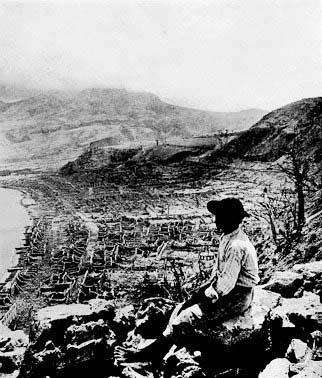Randi Mann
7/5/2021
Listen to The Weather Network's This Day in Weather History podcast on this topic, here.
This Day In Weather History is a daily podcast by The Weather Network that features stories about people, communities, and events and how weather impacted them.
On Wednesday, May 7, 1902, Mount Pelée, on the island of Martinique in the Lesser Antilles, started to erupt. Around 29,000 people died, making it the deadliest eruption of the 20th century and one of the most destructive in recorded history.
On Apr. 23, Mount Pelée started eruptive activity. The volcano let out a series of large phreatic explosions that occurred before subsiding until early May.

This Day In Weather History is a daily podcast by The Weather Network that features stories about people, communities, and events and how weather impacted them.
On Wednesday, May 7, 1902, Mount Pelée, on the island of Martinique in the Lesser Antilles, started to erupt. Around 29,000 people died, making it the deadliest eruption of the 20th century and one of the most destructive in recorded history.
On Apr. 23, Mount Pelée started eruptive activity. The volcano let out a series of large phreatic explosions that occurred before subsiding until early May.

© Provided by The Weather Network1902 eruption.
Photograph of Mt. Pelee by Angelo Heilprin. Courtesy of Wikipedia
When Pelée started to start up again, the sky filled with dark clouds and lightning. The mountain emitted ash that blacked out the sun.
On May 5, a mudflow came down a side of the mountain and buried around 150 people. The mudflow also triggered three tsunamis that damaged coastal buildings.
When Pelée started to start up again, the sky filled with dark clouds and lightning. The mountain emitted ash that blacked out the sun.
On May 5, a mudflow came down a side of the mountain and buried around 150 people. The mudflow also triggered three tsunamis that damaged coastal buildings.
Between May 6 and 7, the phreatic explosions turned magmatic.On May 8, at about 8:00 a.m., the volcano exploded. Lava and turbulent gases flowed down the mountain at hurricane speeds. The volcanic material reached Saint-Pierre at 8:02 a.m. No one could escape. Most of the city's population died. Only two people in the actual city survived, and a few people from surrounding areas. All survivors experienced severe burns.

© Provided by The Weather Network Remains of Saint-Pierre. Courtesy of Wikipedia
Thumbnail: "Evacuees on Rue du Pavé, Fort-de-France after 1902 eruption, photographed by William H. Rau." Courtesy of Wikipedia/William Herman Rau
After the explosion, rescuers headed to the island. On May 20, Mount Pelée exploded again, killing 2,000 of the rescuers and other people who were helping with the aftermath. On Aug. 30, another eruption generated a pyroclastic flow, which killed an additional 800 people.
After the explosion, rescuers headed to the island. On May 20, Mount Pelée exploded again, killing 2,000 of the rescuers and other people who were helping with the aftermath. On Aug. 30, another eruption generated a pyroclastic flow, which killed an additional 800 people.
Mount Pelée continued to erupt until Oct. 1905.
This Day In Weather History is a daily podcast by The Weather Network that features unique and informative stories from host Chris Mei.
No comments:
Post a Comment